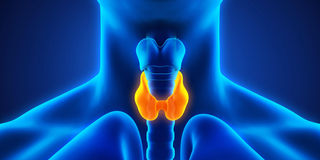My thyroid gland was removed. Can it grow back?

When a total thyroidectomy is done, the whole thyroid gland is removed.
What you need to know:
- The thyroid hormones regulate how your body uses energy.
- They affect breathing, the heart rate, temperature, the brain and nerves.
- They also affect the muscles, the reproductive system, the gastrointestinal system, among others.
Dr Flo,
I had a complete thyroidectomy. Can the thyroid gland regenerate through nutrition so that I do not have to fully depend on thyroxine?
Juma
Dear Juma,
When a total thyroidectomy is done, the whole thyroid gland is removed. This means there is no thyroid tissue left at all and it cannot regrow. You have to take the thyroxine medication every day for the rest of your life to provide the thyroid hormones which the body cannot produce because there is no thyroid gland. The thyroid hormones are very important because they regulate how your body uses energy, and they affect breathing, the heart rate, temperature, the brain and nerves, the muscles, the reproductive system, the gastrointestinal system, among others.
To get the most out of your medication, take the thyroxine on an empty stomach, like 30 minutes to one hour before breakfast or three hours or more after supper. Avoid changing between brands of medication and store the medicine in a cool, dry, dark place. See the doctor regularly for checkups. Avoid “natural” thyroid medication and supplements because sometimes they contain the thyroxine medication or even parts of thyroid glands from other animals which are dangerous.
There is no diet per se for someone who has had a thyroidectomy. Eat healthy, well balanced meals and you may benefit from small frequent meals to keep your energy up. Also, exercise regularly and establish a sleep routine.
Dr Flo,
Where is the prostate located? Why is it so susceptible to cancer?
Walji
Dear Walji,
Men have a small organ (about 30g) called the prostate that is situated just beneath the urinary bladder and it surrounds the urethra as it comes out of the bladder. It produces prostatic fluid which provides a suitable environment for sperms and makes up most of the semen. The prostate also closes the urethra during ejaculation, preventing urination and backflow of semen into the urinary bladder. The prostate also produces an enzyme that helps in testosterone hormone function.
There is no exact known cause of prostate cancer and genetic and environmental factors may contribute to the risk of developing it. It is more common in men who have close male relatives with prostate cancer, in men over the age of 65 years, smokers, those with obesity and those with sedentary lifestyles.
Dr Flo,
Can I completely recover from sudden panic attacks? I have had the problem for more than five years now. I experience uncomfortable moments with my heart pounding, sweating and shaking that impairs my normal functioning.
Maggie
Dear Maggie,
Panic attacks are a symptom of an anxiety disorder. Anxiety is the body’s natural response to stress, fear or worry. It happens all the time because we encounter stressors every day. When that happens, the body prepares itself either to engage the stressor or to run away from it - the fight or flight response. To do this, the body releases messengers like adrenaline and cortisol which determine how fast your heart pumps, raise your blood pressure, increase the breathing rate, increase the amount of glucose in the blood, improve blood supply to the brain and muscles and reduce blood supply to the digestive system. All this is done to enable you to deal with the stressor. But, if the anxiety lasts for long, is in excess and starts interfering with your daily life, then this is an anxiety disorder.
With anxiety disorder, not only do you have a lot of fear and worry, you also have physical symptoms because the body’s stress response is activated for so long that it becomes imbalanced. This explains the sweating, the pounding heart and the shaking. It is advisable for you to see a mental health professional, preferably both a psychiatrist and a psychologist. After assessment, you may be put on medication to reduce the anxiety symptoms and the mental stress. It would also be beneficial for you to go through psychotherapy to learn relaxation techniques and how to manage the stress and anxiety.
Dr Flo,
For the past three years my nose has been very sensitive. I have very bad bouts of sneezing when exposed to allergens such as strong scents, mildew and pollen. This is followed by hours of nonstop nasal discharge that is watery and salty. I also get an itchy throat and palate. Please help.
George
Dear George,
It seems that you have allergic rhinitis. This means your body’s immune process reacts quite strongly to allergens like pollen, mildew, dust, strong smells and cold. These are called triggers and they cause your respiratory system to overreact, with inflammation of the lining of the nose and excessive production of mucus. This causes the sneezing, and sometimes a runny and stuffy nose. This is usually in the genetic make-up of a person, which means it can be passed from parents to children, and it also cannot be eradicated. It is also associated with other allergy conditions like allergic skin rashes, allergic cough, recurrent itching of the eyes (allergic conjunctivitis) and asthma. Someone may have one or a combination of several of them. The condition cannot be cured, but it can be controlled by avoiding the triggers like cold, dust, strong smells, pollen and smoke, and also by taking anti-allergy medicine like anti-histamines and steroids (in severe cases). Nasal sprays can also be used to control it.
Send your medical questions to [email protected] for free expert advice


